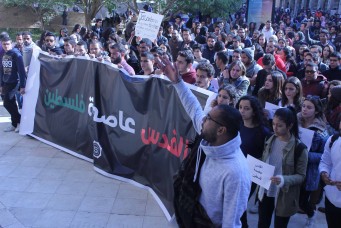Woes of Arab Youth
Study reveals unemployment as number one problem
Many young people experienced the Arab Spring uprisings as their own coming of age story. Today, six years later, they are grappling with the realities of growing up. Sixty-five percent of the region’s 400 million people are under thirty. A demographic that cannot be ignored, Arab youth can either be an empowered source of progress or a dire threat to political and social stability.
How well these youth transition into adulthood—and how their governments respond to their needs—will certainly influence the future of the Middle East. An exhaustive study of those questions by fifteen research organizations from Arab and European countries recently presented an important preliminary finding at the American University in Cairo: for youth living in Mediterranean Arab countries, the number one problem is unemployment, contributing to a desire to emigrate expressed by more than 15 percent of respondents in a survey.
The Sahwa (“Awakening”) Project funded by the European Union explored youth views on everything from politics and culture to gender. Teams of interviewers, data analysts, and researchers conducted a survey with ten thousand individuals between the ages of 15 and 25 in Algeria, Egypt, Lebanon, Morocco, and Tunisia. In addition, ethnographers in each country held discussions with focus groups on local socioeconomic conditions.
According to Bahgat Korany, AUC professor of international relations and political economy and director of the AUC Forum, the project’s Youth Survey found that factors pushing young Arabs to emigrate included a lack of professional opportunities, low incomes, poor living conditions, and a desire to support families. Migration for job-related reasons ranked first at 48 percent among Egyptian survey respondents. Perhaps surprisingly, people of all education levels expressed the desire to leave Egypt; and almost half of Egyptians wishing to migrate are employed but lack job security.
Indeed, Korany learned, the Egypt job market lists many vacancies, but Egyptian youth often fail to qualify for them. The problem, he suspects, is that the Egyptian educational system, which focuses on rote memorization, fails to develop the critical thinking and leadership skills required for the modern economy. Additionally, Korany noted, Arab youth in general place too much emphasis on landing poor-paying public sector jobs; this is due to the desire for job stability and social safety nets.
The Sahwa researchers concluded that better education and labor policies are the keys to enhancing young people’s socioeconomic opportunities and reversing the migration trend. Otherwise, the protests the region witnessed in the 2011 Arab Spring may return. “Youth as a group is usually proactive, pro-change, rightly or wrongly, and they want the change to be immediate,” Korany said. “If it is not, they are ready to go to the street.”


